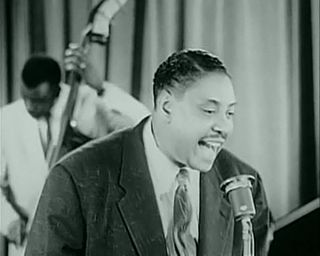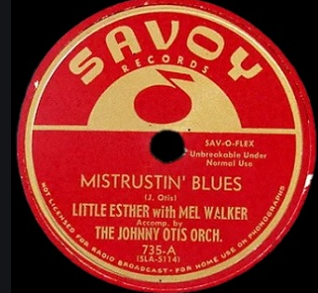Related Research Articles

Rhythm and blues, frequently abbreviated as R&B or R'n'B, is a genre of popular music that originated within the African-American community in the 1940s. The term was originally used by record companies to describe recordings marketed predominantly to African Americans, at a time when "rocking, jazz based music ... [with a] heavy, insistent beat" was becoming more popular. In the commercial rhythm and blues music typical of the 1950s through the 1970s, the bands usually consisted of a piano, one or two guitars, bass, drums, one or more saxophones, and sometimes background vocalists. R&B lyrical themes often encapsulate the African-American history and experience of pain and the quest for freedom and joy, as well as triumphs and failures in terms of societal racism, oppression, relationships, economics, and aspirations.

Modern Records was an American record company and label formed in 1945 in Los Angeles by the Bihari brothers. Modern's artists included Etta James, Joe Houston, Little Richard, Ike & Tina Turner and John Lee Hooker. The label released some of the most influential blues and R&B records of the 1940s and 1950s.
Linked here are Billboard magazine's number-one rhythm and blues hits. The Billboard R&B chart is today known as the Hot R&B/Hip-Hop Songs chart.
"Because of You" is a popular song written by Arthur Hammerstein and Dudley Wilkinson in 1940. It was first recorded by Larry Clinton and His Orchestra on December 12, 1940, and was released March 28, 1941 on Bluebird 11094. It charted for one week and ranked number 95 in the 1941 year-end list.

"Mistrustin' Blues" is a song written by Johnny Otis. It was sung by Little Esther and Mel Walker, accompanied by The Johnny Otis Orchestra, and released on the Savoy label. The record was the second collaboration between Johnny Otis and Little Esther. "Mistrustin Blues" was their second number one record on the R&B chart, which it topped for four weeks. It was ranked No. 10 on Billboard magazine's year-end list of R&B records for 1950 based on sales.

"I Feel So Bad" is a blues song written and originally recorded by Chuck Willis, and released in 1954. It rose to No. 8 on the Billboard Rhythm & Blues Chart in early 1954, and appears on the album Chuck Willis Wails the Blues. Elvis Presley recorded the song on March 12, 1961, in RCA Studio B, in Nashville, Tennessee, and released it as a single on RCA Victor that year.

This article contains information about albums and singles released by of American musician and bandleader Ike Turner.

"No More Doggin'" is a rhythm and blues song written and originally recorded by blues musician Rosco Gordon in 1952. The song featured Gordon's signature "Rosco Rhythm" piano style which became a precursor to Jamaican ska music.
Billboard Top R&B Records of 1953 is made up of two year-end charts compiled by Billboard magazine ranking the year's top rhythm and blues records based on record sales and juke box plays.
Billboard Top R&B Records of 1954 is made up of two year-end charts compiled by Billboard magazine ranking the year's top rhythm and blues records based on record sales and juke box plays.
Billboard Top R&B Records of 1955 is made up of three year-end charts compiled by Billboard magazine ranking the year's top rhythm and blues records based on record sales, disc jockey plays, and juke box plays.
Billboard Top R&B Records of 1956 is made up of three year-end charts compiled by Billboard magazine ranking the year's top rhythm and blues records based on record sales, disc jockey plays, and juke box plays.
Billboard Top R&B Records of 1952 is made up of two year-end charts compiled by Billboard magazine ranking the year's top rhythm and blues records based on record sales and juke box plays.
Billboard Top R&B Records of 1950 is made up of two year-end charts compiled by Billboard magazine ranking the year's top rhythm and blues records based on record sales and juke box plays.
"Well Oh Well" is a song written by Lois Mann, Tiny Bradshaw, and Henry Bernard. The song was based on Bing Crosby's "San Fernando Valley". It was performed by Bradshaw and released on the King label. It debuted on Billboard magazine's R&B chart on May 20, 1950, peaked at No. 2, and remained on the chart for 21 weeks. It was ranked No. 7 on Billboard's year-end list of the best-selling R&B records of 1950. Singer pianist Moon Mullican covered the song, also on the King label, in 1950.

"Roomin' House Boogie" is a song written by Jessie M. Robinson, performed by Amos Milburn, and released on the Aladdin label. It debuted on Billboard magazine's R&B charts on September 10, 1949, peaked at No. 1 on the juke box chart, and remained on the charts for 11 weeks. It was ranked No. 25 on Billboard's year-end list of R&B records for 1950 based on juke box plays.
Billboard Top R&B Records of 1962 is the year-end chart compiled by Billboard magazine ranking the top rhythm and blues singles of 1962.
References
- 1 2 3 "The Year's Top Rhythm & Blues Records" (PDF). The Billboard. January 12, 1952. p. 22.